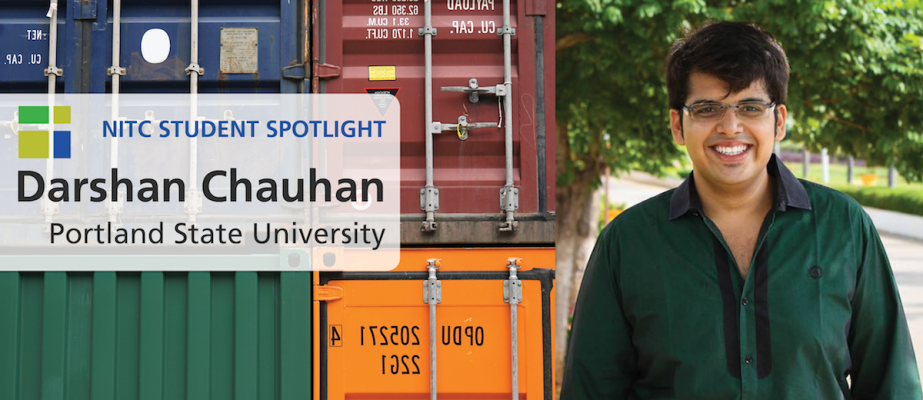Student Spotlight: Darshan Chauhan, Portland State University

Darshan Chauhan, Portland State University
Darshan Chauhan is a graduate research assistant in civil engineering at Portland State University. He currently serves as the treasurer of STEP (Students in Transportation Engineering and Planning), PSU's transportation student group, and generously volunteers his time at a variety of transportation-related events via PSU's Transportation Research and Education Center (TREC). He will defend his masters thesis on network flow problems this year, and plans to continue on to earn his PhD. In the 2018/2019 academic year, Darshan earned a Walter H. Kramer Fellowship from Portland State University.
Tell us about yourself?
I am a second-year Masters student in the civil engineering program with a transportation focus at PSU. I have been training with Prof. Unnikrishnan here to understand, model, and tackle uncertainties in different transportation networks. Before coming to Portland, I completed my Bachelor’s degree in civil engineering at BITS Pilani Hyderabad Campus, working as an undergraduate researcher in areas like fracture mechanics, optimization, and alternate cementitious materials through my junior and senior years. After completing my masters, I am continuing for my Ph.D. in transportation at PSU. Apart from school, I really enjoy cooking and exploring food in general. So, in my free time, I am either doing that or catching up with family and friends.
What (or who) has influenced your career path in transportation?
Civil engineering was an obvious major for me as my father is a civil contractor, and I spent a considerable amount of time visiting his work sites and observing him. I was always fascinated by how an abstraction came into reality and how much of an influence it had on people. But, before coming here, the field of transportation was almost alien to me. I did not know anyone pursuing a career in transportation. It was by chance that I got in touch with Prof. Unnikrishnan here, and it just opened up a dimension that I had only heard of before. Starting from scratch, I have learned a lot in the past two years through all of the people working in transportation at PSU: the faculty, my lab mates, and TREC. Slowly and consistently, I have come to admire the field of transportation a lot, because of the impact it has on people and how people of diverse backgrounds are required to make this impact.
You presented at TRB this year and you'll be defending your thesis soon; tell us about the research you're currently working on?
My research at PSU is heavily influenced by optimization, i.e. decision-making to minimize costs or maximize values while meeting various constraints, applied in the context of transportation. I am working in, broadly, two classes of problems; network flow problems, and facility location problems.
For my thesis, I am working on a network flow problem to identify the critical infrastructure in a network considering various uncertainties in network parameters. For example, consider an illegal substance network from the producer to a substance-abuse market. The goal of the people involved in this activity is to maximize their substance flow to the market, while the goal of the enforcement agency is to minimize this flow by destroying certain arcs with limited available resources. I am researching this problem under a lens of uncertainty, and am utilizing robust optimization techniques to tackle it. The methodologies developed during this research would also be applicable in the context of transportation infrastructure management and for improving the reliability of supply-chain networks. This work is supported by an NSF grant secured by Prof. Unnikrishnan.
For TRB this year, I worked on determining drone (Unmanned Aerial Vehicles) launching sites to supply critical supplies (like blood, medicines) in post-disaster scenarios. This research was inspired by the imminent Cascadia Subduction Zone earthquake which Portland is expecting. Post-disaster, the transportation infrastructure would be crippled and drones provide us with one option to meet some medical requirements of people affected. This research also led to a peer-reviewed publication in Transportation Research Part C.
After earning a Ph.D., what future work do you envision doing in transportation?
I love the work I am doing and I love the vibrancy of an academic institution, so, being a professor at a research-intensive university is the option I am aiming for. I envision myself working in a space at the confluence of optimization, civil engineering, and sustainability. One thing that I have learned over the past few years is that there are definitely opportunities I don’t know about right now. So, I am working towards my goals while keeping an open mindset.
This is an installment in a series of monthly Student Spotlights we're shining on students and alumni that are involved with National Institute for Transportation & Communites (NITC) universities. NITC is a university transportation consortium funded by the U.S. DOT, and is a Portland State-led partnership with the University of Oregon, Oregon Institute of Technology, University of Utah, University of Arizona, and University of Texas at Arlington.
